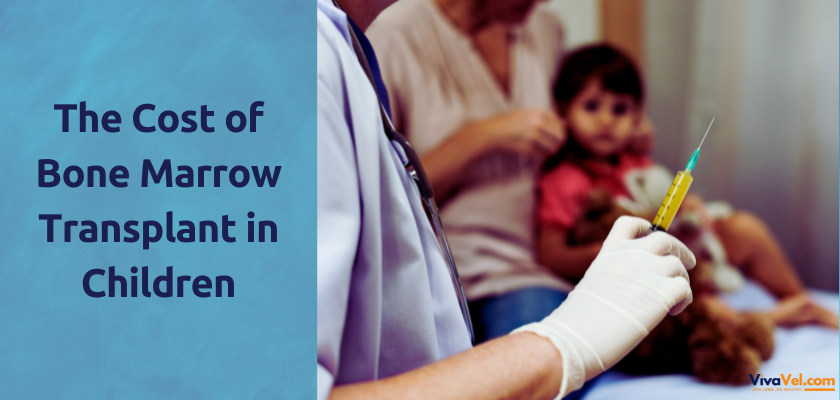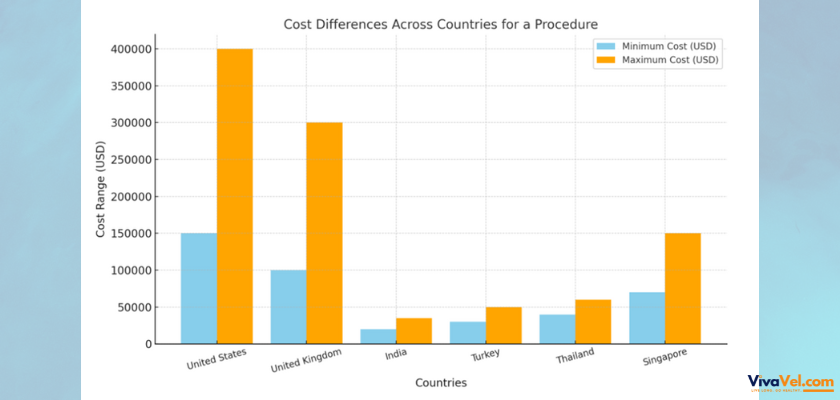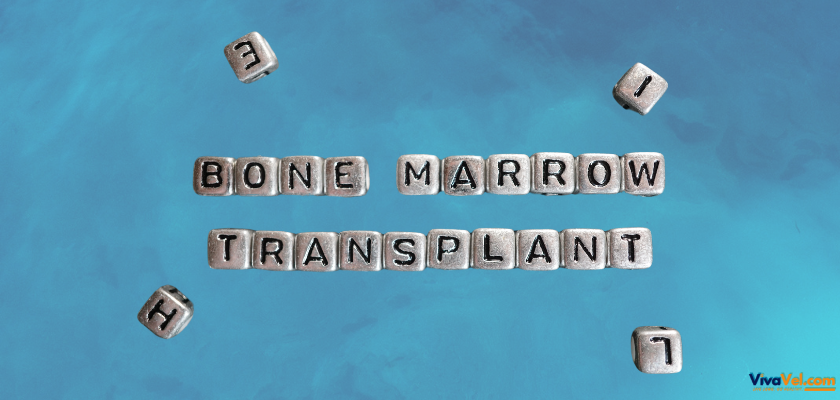
Home / Information / Blog / Blog Detail

Bone marrow transplant (BMT) is a life-saving procedure for children suffering from severe blood disorders, immune deficiencies, and certain types of cancers. While the procedure offers a chance for a new lease on life, it comes with significant financial implications. This blog delves into the cost of bone marrow transplants for children, exploring global cost comparisons, success rates, and factors influencing pricing.
What is a Bone Marrow Transplant?
A bone marrow transplant is a medical procedure that replaces damaged or diseased bone marrow with healthy marrow stem cells. It is commonly used to treat conditions such as:
Leukemia
Lymphoma
Thalassemia
Sickle cell anemia
Severe combined immunodeficiency (SCID)
There are two primary types of BMT:
Autologous Transplant: The patient’s stem cells are used.
Allogeneic Transplant: Stem cells are sourced from a donor, a sibling, a parent, or an unrelated donor.
Cost of Bone Marrow Transplant in Different Countries
The cost of a bone marrow transplant varies significantly worldwide, influenced by factors such as medical infrastructure, the complexity of the procedure, the type of transplant, and post-operative care.
Cost Comparison Bar Graph
A visual representation can provide a clearer picture of the cost differences across these countries. Below is a bar graph illustrating the average costs:

Factors Influencing the Cost of Bone Marrow Transplant
Type of Transplant: Allogeneic transplants are generally more expensive than autologous transplants due to the need for donor matching and additional procedures.
Hospital and Infrastructure: Facilities with advanced medical technologies and highly skilled professionals may charge a premium.
Pre- and Post-Transplant Care: Diagnostics, chemotherapy, and long-term follow-up care costs can significantly increase the overall expense.
Donor Matching: Finding a suitable donor involves additional costs, especially in unrelated donor scenarios.
Geographical Location: The cost of living and healthcare standards in the country of treatment play a crucial role.
Success Rate of Bone Marrow Transplant in Children
The success of a bone marrow transplant largely depends on:
The underlying condition being treated
Patient’s health
Donor compatibility
Post-operative care
Success Rates by Condition
Leukemia: 60% - 90% depending on the stage
Thalassemia: Over 90% of well-matched donor cases
Sickle Cell Anemia: Around 85%
SCID: 90% and above with early diagnosis
Success Rate Bar Graph
The following bar graph compares success rates across various conditions:

Why Consider Medical Tourism for Bone Marrow Transplants?
Medical tourism is becoming popular for families seeking cost-effective and high-quality BMT procedures. Countries like India, Turkey, and Thailand are emerging as leading destinations, offering:
Affordable Costs: Significant savings compared to Western countries.
World-Class Facilities: Accredited hospitals with advanced technologies.
Expert Medical Teams: Highly qualified specialists in hematology and oncology.
Comprehensive Care: Support for international patients, including visa assistance, accommodation, and translation services.
India as a Preferred Destination
India stands out due to its affordable costs and excellent medical services. Key highlights include:
Accredited hospitals like Apollo Hospitals, Fortis Healthcare, and Medanta.
A vast pool of experienced hematologists and oncologists.
Advanced diagnostic and therapeutic facilities.
How VivaVel Health Tourism Can Help
At VivaVel Health Tourism, we understand that a bone marrow transplant is a significant decision for any family. Our team is dedicated to providing:
Customized Treatment Plans: Tailored to your child’s medical needs and budget.
Hospital Selection: Partnerships with leading hospitals worldwide.
Complete Support: Assistance with travel, accommodation, and post-treatment care.
Transparent Pricing: Clear and detailed cost breakdowns.
Conclusion
A bone marrow transplant is a critical procedure that offers hope and a new beginning for children battling severe medical conditions. While the costs can be daunting, understanding the pricing structure and exploring options like medical tourism can make the treatment more accessible. With proper planning and support from organizations like VivaVel Health Tourism, families can ensure the best care for their children without compromising quality.
If you’re considering a bone marrow transplant for your child, reach out to VivaVel Health Tourism for expert guidance and support.


India has emerged as a global hub for advanced medical treatments, including bone marrow transplants (BMT), attracting patients worldwide. With state-of-the-art facilities, skilled specialists, and competitive costs, India offers an ideal combination of quality and affordability for those seeking life-saving procedures like BMT. This blog explores the intricacies of bone marrow transplantation, why India is a preferred destination, and what patients can expect during their journey.
Understanding Bone Marrow Transplant
A bone marrow transplant is a medical procedure to replace damaged or diseased bone marrow with healthy stem cells. These stem cells can be sourced from the patient (autologous transplant), a donor (allogeneic transplant), or umbilical cord blood. The procedure is primarily used to treat conditions such as:
The success of a bone marrow transplant largely depends on factors such as the patient's overall health, the disease stage, and the donor's compatibility.

India has emerged as a global leader in medical tourism, offering cutting-edge healthcare services at a fraction of the cost compared to developed nations. Among these services, bone marrow transplants (BMT) are a life-saving treatment for various blood disorders, cancers, and immune system diseases. This blog delves into the costs of BMT in India, the factors influencing them, and why India is a top choice for patients worldwide.
What is a Bone Marrow Transplant?
A bone marrow transplant is a medical procedure to replace damaged or diseased bone marrow with healthy stem cells. It is commonly used to treat:
Blood cancers such as leukemia and lymphoma
Non-cancerous blood disorders like aplastic anemia
Immune system disorders like severe combined immunodeficiency (SCID)
There are two main types of BMT:
Autologous Transplant: The patient's stem cells are harvested, treated, and reintroduced.
Allogeneic Transplant: Stem cells are sourced from a donor, either related or unrelated, or from umbilical cord blood.
Bone Marrow Transplant Costs in India
The cost of a bone marrow transplant in India is much lower compared to countries like the USA, UK, or Singapore, where prices typically range from $100,000 to $200,000. In India, the average cost is between $15,000 and $40,000, depending on the type of transplant and other factors.
Breakdown of Costs:
Autologous Transplant: Cost: $15,000 - $25,000. The cost is lower because there is no donor search process.
Allogeneic Transplant: Cost: $20,000 - $40,000. The costs are higher due to additional donor-related expenses, such as HLA typing and stem cell harvesting.
Umbilical Cord Blood Transplant: The cost is $25,000 - $45,000. It is more expensive because cord blood units must be procured from international banks.
Factors Influencing Costs
Several factors determine the final cost of a bone marrow transplant in India:
Type of Transplant: Allogeneic transplants are more expensive due to donor-related expenses.
Hospital and Location: Hospitals in metropolitan cities like Delhi, Mumbai, and Bangalore may charge higher fees.
Pre-Transplant Evaluation: Initial tests, including HLA typing and imaging, cost around $1,000 - $2,000.
Post-Transplant Care: Follow-ups, medications, and supportive care can add $5,000 - $10,000.
Hospital Stay: Patients typically stay 2-4 weeks, and private rooms cost $300 - $500 per day.
Complications Management: Infections or graft-versus-host disease (GVHD) can increase costs by $5,000 - $10,000.
Why Choose India for a Bone Marrow Transplant?
India has become a global leader in affordable and high-quality healthcare. Here's why:
Cost-Effectiveness: India offers bone marrow transplants at 60-80% lower costs without compromising quality.
World-Class Facilities: Accredited hospitals, such as Apollo Hospitals, Fortis Healthcare, Medanta, and Tata Memorial Hospital, are equipped with advanced technology and adhere to international standards.
Skilled Specialists: India boasts highly experienced hematologists and oncologists trained in leading global institutions.
Comprehensive Care: From pre-transplant evaluation to post-transplant follow-up, Indian hospitals provide end-to-end care, including psychological support and nutritional guidance.
Shorter Waiting Times: Unlike in some countries, where patients may wait months for a transplant, Indian hospitals ensure prompt scheduling.
Top Hospitals for Bone Marrow Transplants in India
Apollo Hospitals (Multiple Locations): Apollo Hospitals is a leading healthcare provider in India, offering advanced bone marrow transplant (BMT) services across its branches. With state-of-the-art facilities and a team of experienced hematologists, oncologists, and transplant specialists, Apollo ensures high success rates for both autologous and allogeneic transplants. The hospital has specialized stem cell labs and apheresis units to handle complex cases. Its multidisciplinary approach to patient care ensures comprehensive support from diagnosis to post-transplant recovery.
Fortis Memorial Research Institute (Gurgaon): Fortis Memorial Research Institute (FMRI) is a premier destination for bone marrow transplants in India, known for its advanced hematology and oncology departments. The hospital provides cutting-edge therapies, including haploidentical and unrelated donor transplants. With highly skilled specialists and advanced infection control protocols, FMRI ensures optimal patient outcomes. Its patient-centric care model includes psychological counseling, nutritional support, and long-term follow-up programs to enhance recovery.
Medanta - The Medicity (Gurgaon): Medanta - The Medicity is a renowned center for bone marrow transplants, offering a wide range of services such as autologous, allogeneic, and haploidentical transplants. The hospital boasts a state-of-the-art stem cell laboratory and dedicated BMT units with strict infection control measures. Its multidisciplinary team of experts provides personalized care to ensure the best outcomes. Medanta is recognized for its expertise in treating complex blood disorders and cancers through advanced transplant techniques.
BLK-Max Hospital (Delhi): BLK-Max Hospital is a leading facility for bone marrow transplants, equipped with cutting-edge technology and a highly experienced team of specialists. The hospital offers a full spectrum of transplant options, including matched siblings, unrelated donors, and haploidentical transplants. Its dedicated bone marrow transplant unit is designed with HEPA filters to maintain a sterile environment, reducing the risk of infections. BLK-Max also provides comprehensive pre-and post-transplant care, ensuring a smooth recovery for patients.
Gleneagles Global Hospital(Multiple Locations): Gleneagles Global Hospital is a top choice for bone marrow transplants in India, offering world-class facilities and highly specialized care. The hospital is known for handling complex cases, including those requiring unrelated donor and haploidentical transplants. With advanced diagnostic and therapeutic capabilities, it provides personalized treatment plans tailored to each patient's needs. Gleneagles Global emphasizes a holistic approach, including psychological support and patient education, to ensure better outcomes and long-term health.
Preparation for a Bone Marrow Transplant in India
International patients planning for a BMT in India should consider the following:
Medical Records: Share all relevant medical reports, including diagnosis and previous treatments.
Travel Arrangements: Plan a 2-3 month stay to cover pre-and post-transplant care.
Budget Planning: Account for additional costs like accommodation, food, and transportation.
Caregiver Support: Patients need a caregiver to assist during the procedure and recovery.
Success Rates of Bone Marrow Transplants in India
India's success rates for bone marrow transplants are on par with global standards, ranging between 60% and 90%, depending on the following:
Early diagnosis and timely treatment
Availability of a suitable donor
The expertise of the medical team
Conclusion
India offers a unique blend of affordability, expertise, and world-class medical care for bone marrow transplants. With costs ranging from $15,000 to $40,000, patients can save significantly while receiving top-quality treatment. For international patients seeking life-saving procedures, India's healthcare system provides an accessible and reliable solution.
Why Choose VivaVel Health Tourism?
At VivaVel Health Tourism, we partner with India's leading hospitals and specialists to ensure a seamless and comfortable experience. From initial consultations to post-treatment care, we are committed to supporting you every step of the way.
Contact us today to learn more about bone marrow transplants in India and how we can assist you in your medical journey.


Bone Marrow Transplant in Children: A Comprehensive Guide
Bone marrow transplantation (BMT) is a life-saving medical procedure that has revolutionized the treatment of serious illnesses in children. By replacing damaged or diseased bone marrow with healthy stem cells, BMT offers a new lease on life for children facing cancers, genetic disorders, and immune deficiencies. Understanding this procedure is crucial for families exploring advanced medical care.
What is Bone Marrow, and Why is it Important?
Bone marrow is the soft, spongy tissue inside our bones that produces essential blood components: red blood cells (for oxygen delivery), white blood cells (for immune defense), and platelets (for blood clotting). When bone marrow fails, these critical functions are disrupted, leading to severe health problems.
What Happens in a Bone Marrow Transplant?
A BMT involves infusing healthy stem cells into a child's body to replace damaged bone marrow. The stem cells can come from the child's body (autologous transplant) or a donor (allogeneic transplant). Once transplanted, these cells settle in the bone marrow and produce healthy blood cells.
When is a Bone Marrow Transplant Needed?
Doctors may recommend a transplant for children with conditions such as:
Blood cancers like leukemia and lymphoma.
Blood disorders like aplastic anemia, thalassemia, and sickle cell disease.
Immune deficiencies such as Severe Combined Immunodeficiency (SCID).
Genetic or metabolic disorders like Hurler syndrome and adrenoleukodystrophy.
Types of Bone Marrow Transplants
Autologous Transplant: The child's stem cells are collected and preserved before receiving intensive treatments like chemotherapy. These cells are then reintroduced to regenerate healthy bone marrow.
Allogeneic Transplant: Stem cells are obtained from a donor, a sibling, an unrelated volunteer, or a parent. This type is often used for genetic disorders or cancers requiring complete marrow replacement.
Umbilical Cord Blood Transplant: This procedure uses stem cells collected from a newborn's umbilical cord. It is a great option when a closely matched donor isn't available.
The Bone Marrow Transplant Journey
The process involves several stages:
Preparation (Conditioning):
High-dose chemotherapy or radiation eliminates diseased bone marrow and suppresses the immune system to reduce rejection risks.
Stem Cell Infusion:
The healthy stem cells are infused through a central venous catheter, similar to a blood transfusion.
Engraftment:
Over 2-4 weeks, the transplanted stem cells settle in the bone marrow and begin producing new blood cells.
Recovery:
Close monitoring is essential to detect complications like infections, organ dysfunction, or graft-versus-host disease (GVHD). Recovery can take months to a year.
Challenges and Risks
Although BMT offers hope, it comes with risks:
Infections: With weakened immunity, children are more vulnerable.
GVHD: In allogeneic transplants, donor cells may attack the child's tissues, causing complications.
Organ Damage: Chemotherapy or radiation can affect organs like the liver or heart.
Delayed Recovery: Some children may take longer to recover or face engraftment failure.
Post-Transplant Care
Healing doesn't end with the procedure. Post-transplant care is critical:
Preventing infections: Strict hygiene and prophylactic medications help protect against infections.
Regular check-ups: Frequent blood tests and follow-ups ensure the transplant works and complications are addressed early.
Nutrition and diet: A balanced diet supports recovery while avoiding raw or undercooked food minimizes infection risks.
Emotional support: Counseling helps children and families cope with recovery's physical and emotional demands.
Why Consider Health Tourism for BMT?
Health tourism opens doors to world-class medical care at more affordable costs. Countries like India have become hubs for advanced treatments, offering top-tier hospitals, skilled specialists, and personalized care. VivaVel Health Tourism ensures families receive seamless support, from hospital selection to travel arrangements.
The Impact of Bone Marrow Transplants
A successful bone marrow transplant can be transformative. It can cure previously untreatable conditions, improve quality of life, and allow children to live healthy, fulfilling lives. Advances in medical technology, such as reduced-intensity conditioning and gene therapy, continue to improve outcomes and make the procedure safer.
Conclusion
Bone marrow transplantation in children represents a beacon of hope for families grappling with life-threatening illnesses. While the journey is challenging, the outcomes can be profoundly rewarding. VivaVel Health Tourism is dedicated to guiding families through this transformative process, ensuring access to the best care and resources. With advancements in medical science and global healthcare collaboration, every child's dream of a healthy future is within reach.
Your child's healing journey begins here—partner with VivaVel Health Tourism for world-class care and compassionate support.

STEP 1
Let us know your details and preferences. We maintain absolute data confidentiality. All your health records are safe, and privacy is maintained.
STEP 2
A dedicated counsellor will help you with the Best Hospital & Doctors at the lowest possible Prices.
STEP 3
While you decide on the treatment plan, we assist you with priority appointments, Visa, Documentation, Hotel & other Logistics.
STEP 4
Our team assists you with all your local requirements like Hospitalization, Hotel Stay, Transportation, Food, Forex, Lab Tests, Medicines, etc.
STEP 5
We ensure a smooth discharge process. We also assist you in tallying your bills at the hospital, all necessary documentation, and your return trip.

"VivaVel" has truly made a life-changing impact on our lives during a challenging time. My wife was diagnosed with Polycystic Ovarian Disease (PCOD), and despite consulting three different doctors in Bangladesh, we were unsatisfied and uncertain about the way forward. It was a confusing and challenging phase until a friend recommended VivaVel.
From the moment "I contacted them", VivaVel provided exceptional support and guidance. They arranged telemedicine consultations with two renowned international doctors, giving us the confidence to make an informed decision. After careful consideration, we selected one of the doctors for my wife's treatment.
VivaVel's assistance went above and beyond our expectations. They helped us with critical processes like obtaining a medical visa invitation letter, visa processing, and coordinating my wife's admission to "Artemis Hospital" in Delhi. They even suggested comfortable accommodations for me as a patient attendant.
What truly stood out was their unwavering support throughout our journey. The "VivaVel team" was always just a phone call away, offering guidance and reassurance during our stay in Delhi. Their professionalism and dedication to helping patients and their families are truly commendable.
I am incredibly grateful for the care and support from "VivaVel." They were a beacon of hope for us during this difficult time, and I sincerely hope they continue their outstanding service to help more needy patients.
Thank you, "VivaVel," for being there for us every step of the way!
Mr. Hoque, Dhaka, Bangladesh
Patient name: Shanta Islam, Dhaka, Bangladesh

Note : VivaVel does not provide medical advice, diagnosis or treatment. The services and information offered on www.vivavel.com are intended solely for informational purposes and cannot replace the professional consultation or treatment by a physician. All Copyrights are reserved with VivaVel. VivaVel does not allow copying and cloning of its webpages and contents. VivaVel reserves the right to follow the legal procedures to protect its intellectual property.
Copyright © 2025 VivaVel.com . All Rights Reserve.




